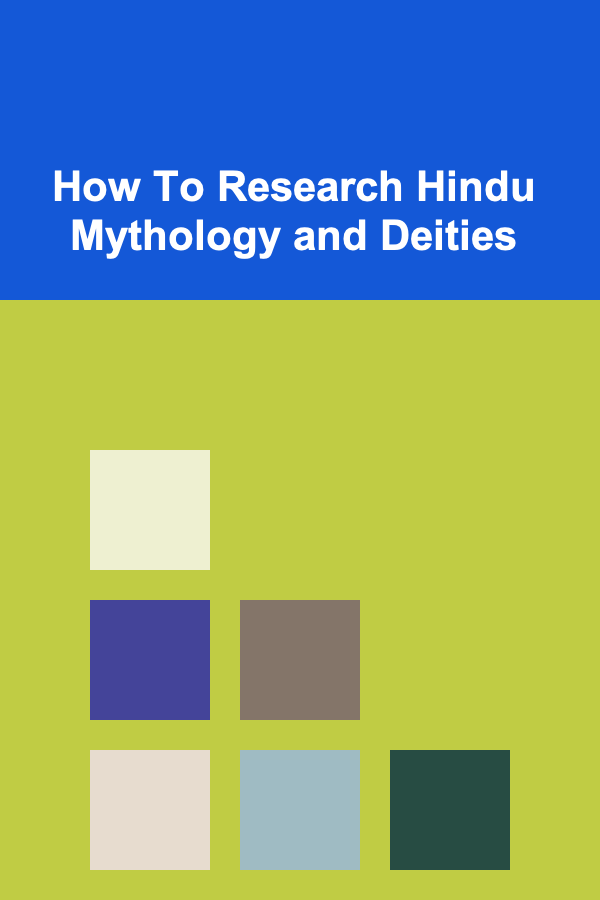
How To Research Hindu Mythology and Deities
ebook include PDF & Audio bundle (Micro Guide)
$12.99$5.99
Limited Time Offer! Order within the next:

Hindu mythology is one of the oldest and most complex systems of beliefs and practices in the world. The vast array of gods, deities, and mythological stories not only offers an insight into ancient Indian civilization but also provides a rich tapestry of symbolic meanings, cultural contexts, and religious philosophies. For those seeking to research Hindu mythology and its deities, it can initially seem overwhelming due to the sheer volume and diversity of texts, practices, and interpretations. However, with a structured approach, anyone can begin to delve into the fascinating world of Hindu myths and gods.
In this article, we will discuss the foundational principles behind Hindu mythology, offer strategies for research, and guide you through the primary resources available. This will equip you with the tools necessary to navigate this multifaceted subject, allowing for a deeper understanding of Hindu mythology and its deities.
Understanding the Foundations of Hindu Mythology
Before beginning a detailed research study into Hindu mythology, it is important to grasp its core concepts and principles. Hindu mythology is deeply intertwined with religion, philosophy, and cosmology, and its stories are a reflection of the metaphysical ideas that form the foundation of Hinduism.
1.1 The Concept of Dharma
In Hinduism, dharma refers to the moral order of the universe, as well as an individual's righteous duty in life. This concept is integral to many mythological stories, where deities, heroes, and even demons are often caught in the struggle to uphold or violate dharma. Understanding dharma is essential when interpreting mythological narratives, as the behavior and decisions of characters are often judged based on their alignment with it.
1.2 The Concept of Karma
Karma is another central idea in Hindu mythology, referring to the law of cause and effect, where every action has consequences. It is a crucial element in the lives of deities and mortals alike. Many mythological stories show how a character's past actions (karma) influence their present and future, shaping their destiny.
1.3 The Cycles of Creation and Destruction
Hindu cosmology is cyclical, with the universe undergoing endless cycles of creation, preservation, and destruction. These cycles are governed by the gods Brahma , Vishnu , and Shiva , who represent creation, preservation, and destruction respectively. The idea of cyclical time and the concept of the four Yugas (ages) provides a framework for understanding the movement of mythological narratives across time.
1.4 The Role of Deities in Hindu Mythology
Deities in Hindu mythology are not merely symbolic figures; they are powerful cosmic forces that embody various aspects of existence, such as creation, destruction, knowledge, wealth, and more. Some deities, like Brahma , Vishnu , and Shiva , are part of the Hindu trinity (Trimurti), while others, like Lakshmi , Saraswati , Durga , and Ganesh, represent a variety of divine attributes. Understanding the roles and relationships between these deities is key to comprehending the broader scope of Hindu mythology.
Approaching the Research of Hindu Mythology
Once you have a foundational understanding of Hindu mythology, you can begin to structure your research. This subject requires an interdisciplinary approach, combining religious studies, historical analysis, cultural context, and textual criticism. Here are some essential steps to help guide your research process:
2.1 Identify the Scope of Your Research
Hindu mythology is vast and diverse, spanning thousands of years and a multitude of regions, languages, and traditions. It is important to narrow down your focus early in the process. You may wish to research specific deities, mythological epics, or even the evolution of mythological stories over time. Here are some potential areas of focus:
- The Puranas and their Influence on Mythology: The 18 Puranas are texts that contain many of the foundational mythological stories, and they vary in their treatment of deities and stories.
- The Vedas and Upanishads: These ancient texts contain some of the earliest references to the gods, particularly in hymns and invocations.
- The Epics -- The Mahabharata and Ramayana: These two epics are fundamental texts in Hindu mythology, each offering a rich canvas of gods, heroes, and moral dilemmas.
- Regional Variations: Hinduism and its mythology vary greatly across regions. A study focusing on one particular region (e.g., Tamil Nadu, Bengal, Kashmir) can yield a deeper understanding of local myths and deities.
2.2 Choose Your Primary Sources
Hindu mythology has an extensive and diverse set of primary sources. To gain a well-rounded understanding, it is crucial to read and analyze the foundational texts. Here are the key texts you should focus on:
2.2.1 The Vedas
The Rigveda , Yajurveda , Samaveda , and Atharvaveda form the core of ancient Hindu scriptures. While the Vedas are primarily focused on rituals, hymns, and philosophical ideas, they also contain references to many of the gods, like Indra , Agni , and Varuna. These texts are essential for understanding the earliest stages of Hindu mythological development.
2.2.2 The Upanishads
The Upanishads are philosophical texts that delve into metaphysical questions, often exploring the nature of the soul, the universe, and the relationship between humans and gods. Many of the concepts introduced in the Upanishads, such as the idea of Brahman (universal spirit) and Atman (individual soul), are crucial for understanding Hindu mythology and its spiritual underpinnings.
2.2.3 The Mahabharata and Ramayana
The Mahabharata and Ramayana are two of the most significant epics in Hindu mythology. The Mahabharata , with its complex narrative and characters, explores the themes of dharma, justice, and the role of the divine in human affairs. The Ramayana , on the other hand, focuses more on the moral and ethical qualities of the hero Rama and his relationship with his family and the gods.
2.2.4 The Puranas
The Puranas , such as the Vishnu Purana , Shiva Purana , and Bhagavata Purana, contain detailed stories about the gods, their avatars, and their interactions with humans. These texts often provide a more elaborate and accessible narrative of mythology compared to the Vedic texts.
2.3 Learn the Language and Context
Hindu mythology spans a wide range of languages and cultural contexts. Many of the primary texts were written in Sanskrit, while others have been translated into regional languages. Understanding the language of the original texts is ideal for accurate interpretations, but learning to read translations by reputable scholars can still provide substantial insights.
It is also important to study the historical and cultural context in which these texts were written. Hindu mythology is deeply embedded in the social and cultural practices of ancient India. Understanding the historical conditions, the role of caste, and the societal norms of the time can help clarify certain elements of mythological stories.
2.4 Engage with Secondary Sources
Secondary sources, including academic books, articles, and commentaries, are invaluable in the research process. Scholars of Hindu mythology offer critical interpretations, contextual analysis, and cross-cultural comparisons that can deepen your understanding of the texts.
When using secondary sources, focus on reputable authors and publications, and aim to engage with diverse perspectives. For example, Mircea Eliade 's works on comparative mythology or Wendy Doniger 's translations and analyses of the Mahabharata can provide deeper layers of understanding.
2.5 Use Modern Tools and Databases
In the digital age, research has become more accessible through online databases and resources. Websites like Internet Sacred Text Archive , Sacred Texts , and Project Gutenberg offer free access to many important Hindu scriptures. You can also find translations, commentaries, and research papers on platforms like Google Scholar or JSTOR.
Analyzing Hindu Mythology
Once you have gathered your primary and secondary sources, you can begin analyzing the mythology and deities. This step involves interpreting the stories, understanding their symbolism, and examining the interactions between gods and humans. Some of the most crucial analytical methods include:
3.1 Symbolism and Allegory
Many mythological stories are deeply symbolic and contain hidden meanings. A hero's journey might symbolize the process of spiritual awakening, while a deity's battle against demons may represent the eternal conflict between good and evil. Understanding the deeper symbolic meanings behind mythological stories can reveal the philosophical and spiritual lessons they convey.
3.2 Cross-Cultural Comparisons
Hindu mythology is rich with parallels to other world mythologies, such as those found in Greek, Roman, Egyptian, or Norse traditions. Comparative analysis can illuminate universal themes that transcend cultural boundaries, such as the hero's journey or the creation myths shared by various civilizations.
3.3 Evolution of Mythology
Hindu mythology has evolved over millennia. The interpretations of gods and stories have changed in response to shifts in religious practices, cultural norms, and political conditions. For example, the portrayal of deities in the Puranas differs from their representation in the Vedas. Tracing this evolution can provide a clearer picture of how mythology adapts to the needs of society.
Conclusion
Researching Hindu mythology and deities is a rewarding and intellectually stimulating endeavor that can deepen one's understanding of religion, culture, and human nature. By engaging with primary texts, understanding the cultural and historical context, and applying modern research tools, you can begin to unravel the mysteries of Hindu mythology and gain a more nuanced appreciation of its deities. Whether your interest lies in the symbolic meanings behind mythological stories or the historical development of religious practices, there is always more to discover in the fascinating world of Hindu mythology.

Best Organization Tools for Managing Client Relationships
Read More
How to Build a Risk Management Checklist for Software Implementation
Read More
How to Design a Data Analysis Checklist for Cleaning Raw Data
Read More
How to Save Money on Groceries with a Home Budget
Read More
How To Dive Deep into the World of Post-Punk
Read MoreHow to Build a Simple Estate Planning Expense Tracker Spreadsheet
Read MoreOther Products

Best Organization Tools for Managing Client Relationships
Read More
How to Build a Risk Management Checklist for Software Implementation
Read More
How to Design a Data Analysis Checklist for Cleaning Raw Data
Read More
How to Save Money on Groceries with a Home Budget
Read More